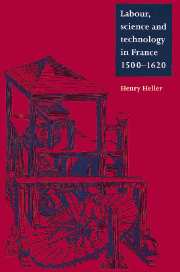Book contents
- Frontmatter
- Contents
- List of illustrations
- Preface
- List of abbreviations
- Introduction
- 1 The expansion of Parisian merchant capital
- 2 Labour in Paris in the sixteenth century
- 3 Civil war and economic experiments
- 4 Inventions and science in the reign of Charles IX
- 5 Expropriation, technology and wage labour
- 6 The Bourbon economic restoration
- 7 Braudel, Le Roy Ladurie and the inertia of history
- Bibliography
- Index
- CAMBRIDGE STUDIES IN EARLY MODERN HISTORY
7 - Braudel, Le Roy Ladurie and the inertia of history
Published online by Cambridge University Press: 01 October 2009
- Frontmatter
- Contents
- List of illustrations
- Preface
- List of abbreviations
- Introduction
- 1 The expansion of Parisian merchant capital
- 2 Labour in Paris in the sixteenth century
- 3 Civil war and economic experiments
- 4 Inventions and science in the reign of Charles IX
- 5 Expropriation, technology and wage labour
- 6 The Bourbon economic restoration
- 7 Braudel, Le Roy Ladurie and the inertia of history
- Bibliography
- Index
- CAMBRIDGE STUDIES IN EARLY MODERN HISTORY
Summary
E pur si muove.
In summarizing the results of this enquiry into French science, technology and economic life from the beginning of the sixteenth century until the time of Richelieu, emphasis has to be laid on the importance of two interrelated rural phenomena: proto-industrialization and primitive accumulation. During the first part of the sixteenth century, there was a great expansion of rural manufacture based on more extensive employment of wind and water power, and the use of the forests as a source of both energy supplies and raw materials. Mining, quarrying, iron, glass and ceramic manufacture all developed. At the same time, the countryside saw a great expansion of textile manufacturing extending beyond the manufacture of wool cloth to linen and canvas as well as silk. The introduction of new techniques certainly played a part – silk-spinning machines, improvements in the printing press, new tools in mining – but the essential gains came from the development of a relatively new labour process, namely the systematic exploitation of rural labour by merchant capitalists.
The economic expansion of the first part of the century came to an end with the outbreak of the wars of religion in the 1560s. The crisis which came to a head in that decade was the product of deep-seated problems in French economic life. The benefits of economic expansion had gone to fewer and fewer people as the century progressed.
- Type
- Chapter
- Information
- Labour, Science and Technology in France, 1500–1620 , pp. 197 - 219Publisher: Cambridge University PressPrint publication year: 1995



